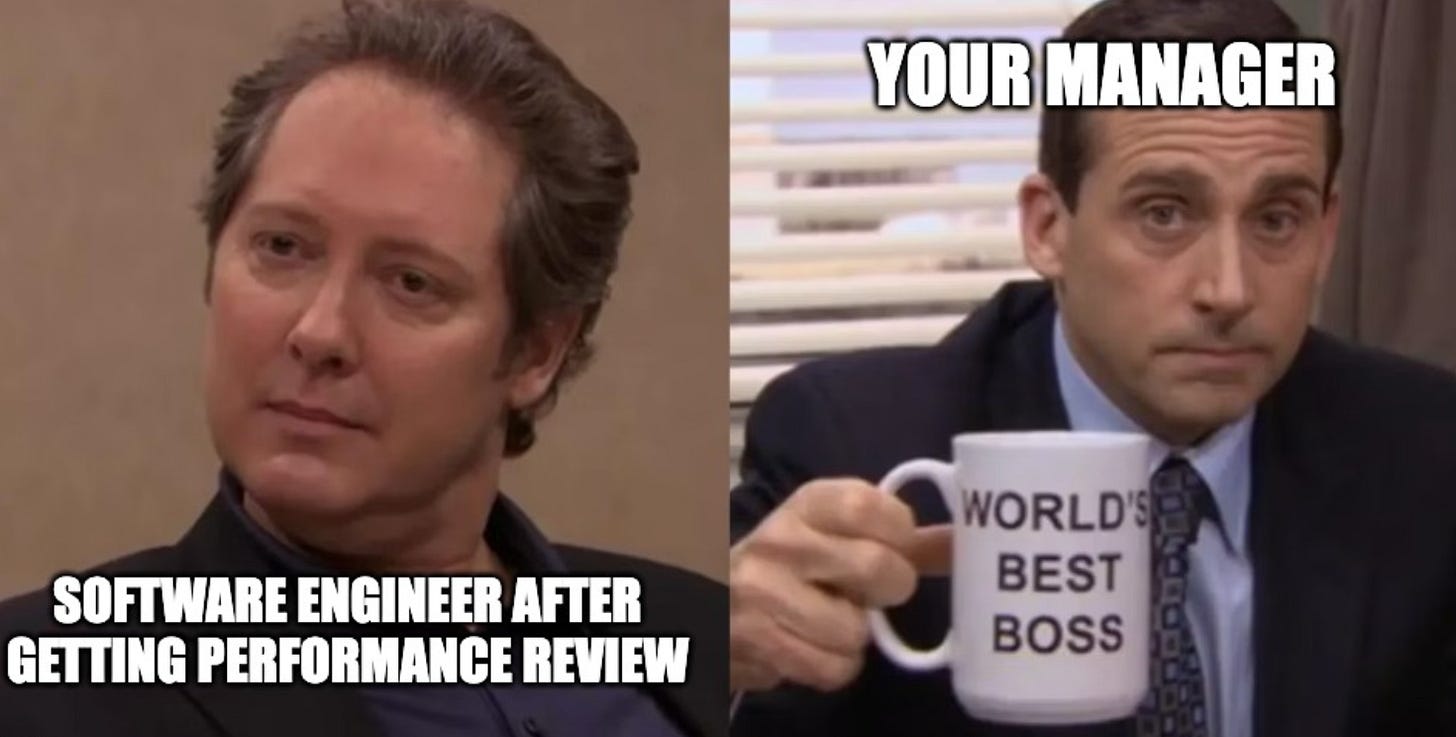Performance Reviews are NOT Magical
They are meant to empower you, truly!
👋 Hey there, fellow tech enthusiasts, professionals, and wanderers of the digital realm! 🚀
I am Gourav. I write about Engineering, Productivity, Thought Leadership, and the Mysteries of the mind!
Performance reviews could be stressful. Back when I was a junior engineer, watching managers and senior engineers go into a performance review was enough to make me nervous.
“Would they delve into my pull requests? Could they possibly overlook my successes and zero in on that one incident where my code caused a hiccup? Am I being seen as just an average performer?” - endless questions pop up in my mind.
I've worked as a Staff+ Engineer for quite some time and have been part of many such conversations. With experience, I can tell that performance reviews are supposed to help you and not go against you. The process is designed NOT to scrutinize but to help you grow. Staff+ folks are invited in there to back you up when preconceived notions come into play.
Today, I'll share my firsthand experience to help you all understand the dynamics of perf reviews and calibrations and what role Staff+ engineers play in reviews. Towards the end, I will share what assessment I am getting in my reviews to help explain why the feedback should be ‘NO Surprise’
Staff+ and Managers Crush Bias During Review Prep
As a Staff Engineer, when performance season came around, I started getting lots of messages on Slack from managers asking for feedback on various junior and senior engineers.
This made me curious about what happens behind the scenes in preparing for performance reviews.
Luckily, I have many Engineering managers as close friends, and I got to understand what they do before the meeting. 😀
Here’s what Engineering Managers do “before” the review meeting:
They think about the growth, successes, setbacks, strengths, and weaknesses of their team members.
They gather data points, looking at code contributions, design documents, and peer feedback.
Then, they talk to senior or staff engineers to get more feedback and confirm their own thoughts. This validation through feedback is crucial for them before the review meeting.
Then they form opinions about each team member. For those doing well, they plan a path for promotion. For those consistently falling short, they create a performance improvement plan (PIP) and a plan to help them grow.
This cleared up two of my big doubts:
Managers do prep a lot and put in a lot of effort.
They don't want to push their own ideas as feedback. Instead, they seek diverse input, avoiding personal bias in decision-making.
But what if your manager is playing games?
When I joined my first-ever performance review meeting, I was surprised at how the process is designed to keep everyone in check.
Senior managers typically invite Engineering Managers (EMs) whose subordinates undergo calibration. They also invite senior and staff+ engineers to help in the goal is to turn anecdotes into facts.
Here’s what happens in the review meeting:
EMs are asked to discuss the strengths and growth points of key teammates.
Effective managers provide a growth-focused perspective and data-driven feedback. They also give estimated ratings on a five-level scale to the engineers they manage.
They brief on why a particular engineer deserves a higher rating, possibly being on a promotion path, and why others may need support, guiding them toward not meeting expectations.
Whenever a manager proposes someone for a promotion, they are often encouraged to make a promo plan and work on it immediately if there are no concerns.
Conversely though, if someone is put on a performance plan, managers face scrutiny. They are questioned about regular feedback and support to prevent reaching a point where a 'plan' is necessary.
Staff Engineers are asked to validate points. I recall a time when I took part in reviews and saved an Engineer from a Performance Improvement Plan (PIP) with strong data points.
But here are the interesting points I learned:
Performance reviews aim to help, not penalize. Your manager plays a crucial role in your success, if they rate you lower, it reflects poorly on them first and on you later.
Regular feedback is crucial; otherwise, both your manager and senior/staff engineer are at stake.
Calibrations ensure that you are set up for success
Post reviews, come calibrations. Calibrations ensure employees aren't judged solely on occasional hiccups or wins. They are judged on consistent, regular tracks.
In my view, this is the most crucial part of the process as it recognizes that impact and performance aren't a straightforward, linear scale.
Expectations may dip due to factors like team changes, project prioritization, extended leaves (such as maternity or paternity), and the employee's reputation.
So, your judgment isn't solely based on your code; it extends to your overall dynamics, like influence, historic contributions, and organizational factors.
Key learnings are:
As long as you keep on working hard, deliver value, and keep good relationships, these hold significant importance.
Occasional hiccups won’t make a difference if you are otherwise a good engineer.
What feedback am I going to get this time?
I know what feedback I am going to get this time in my performance review.
How do I know before I even received it?
Simple, because Performance Review feedbacks aren’t supposed to be surprises. They are meant to be a reminiscence of the regular feedback you get in your 1:1s.
My manager has lots of experience in managing people. He is also technically strong. He figures out when things may go wrong and gives immediate, positive feedback that sounds charming.
In my past 1:1s, we have been discussing how can I make my written communication like Slack announcements, cross-team feedback capturing, and other documentation crisp and concise. So, there you go…this is what I am going to get in my performance review.
You know the interesting part? I am already working to improve on this before getting it officially stoned out!
🥂 Shoutouts
Give Feedback that Helps, not Hurts by
How Canva Supports Real-Time Collaboration for 135 Million Monthly Users by
Mastering Leadership: Why We Hesitate Giving True Feedback by
Taking Decisions in Engineering Teams by
I wish I started doing this on day 0 of my career as an engineer by
Let’s Connect
If we haven't crossed paths previously, I'd be delighted to receive a message from you!
Sponsorship
Unlock the potential for your business to shine! Simply reply to this email or DM on LinkedIn, and let's embark on this exciting journey together. Here are the details of various sponsorship packages.
Collaboration on mind?
I am more than happy to collaborate! Whether it's cross-content sharing, podcasts, or interviews, let's create something amazing together. My DMs are open on LinkedIn.
Also, don't hesitate to reply to this email and introduce yourself. I make it a point to respond to every direct message, email, and comment.
Follow me for daily informational
Follow me on LinkedIn for daily interesting bytes, discussing all things software engineering, leadership, financial freedom, mindfulness, productivity —let's connect:
Be the change you want to see,
Gourav Khanijoe






The calibration phase is super important for the managers! I appreciate it a lot when other engineers provide me with meaningful inputs on other engineers, when they understand it's not hurting their friends because they 'rat' on them, but the other way around.
Good perspective into calibrations. Also thanks for the mention :)